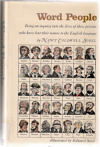

| Book of the Month | ||
 |
Word People |  |
Publisher: American Heritage Press
Authors: Nancy Caldwell Sorel
US$10.90
ISBN 07 059648-4
The sub-title of this book describes it very well 'Being an inquiry into the lives of those persons who have lent their names to the English language'. In short, this is a vocabulary book that will help you to memorize some eighty less-common English words by telling of the lives of the people whose actions created them. So if you cut something short, you might guillotine it, a word which comes from the infamous guillotine of the French Revolution, which in turn comes from Dr Guillotine who first proposed the device, and spent much of his later life trying to save people from it. Oddly enough, another person who almost was guillotined for his moderation and attempts to save people from beheading was none other than the Marquis De Sade, who gave the word 'sadism' to the world.
In 303 pages, from Ampere to Zeppelin, the book takes us through the often odd and sometimes truly extraordinary lives of people whose names we use every day without thinking. Did you know, for example that 'nicotine' comes from Jean Nicot, a French tobacco grower and dictionary enthusiast? Diesel comes from the German-born inventor of the same name. Each of the mini-biographies starts with the definition of the word, and then spends a page or two describing the life of the person concerned and how their name ended up on the item or activity related to them. So it will not come as a surprise to learn, for example that Captain Boycott was boycotted, or that Mr Lynch was in favour of lynching people. However, how many people know that 'pickle' comes from William Beukel, a 14th century Dutchman who came up with the idea of preserving fish in a mixture of salt and vinegar? The words in the book are alphabetically arranged, and have full-page black-and-white illustrations by the author's husband. Perhaps the main complaint one could make against this charming little book are that some entries could have been shortened to include more names (the writer admits the list in incomplete). Because none of the biographies are connected, this is a good book for reading short sections at random to fill a few spare minutes.
Who is this book for? Though it will teach some vocabulary, there are faster ways to learn words. But this book is ideal for those people who love English as a language and are curious about how it developed. Again this would make a useful book in an EFL library, even if there are better books for a language student to buy.
Verdict: More interesting than helpful to language learners
Assessment 7/10